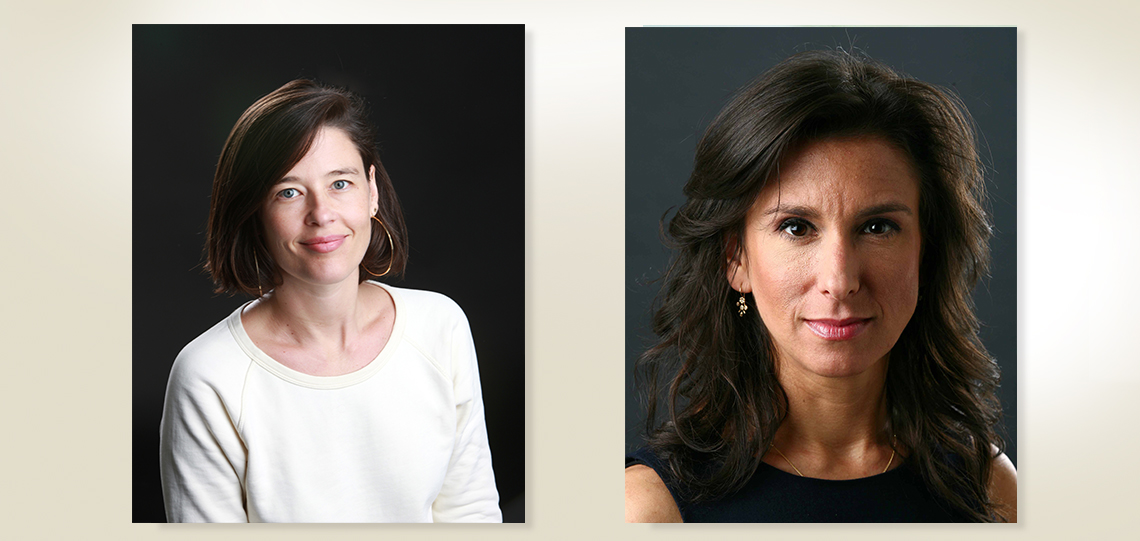The two New York Times reporters who broke the story of Harvey Weinstein’s decades of alleged abuse toward women are the 2018 recipients of the McGill Medal for Journalistic Courage.
New York Times investigative reporters Jodi Kantor and Megan Twohey will receive the medal from the University of Georgia Grady College of Journalism and Mass Communication and its McGill Program for Journalistic Courage. The award ceremony will take place April 10 at 4:30 p.m. in the Peyton Anderson Forum, and Kantor will accept the award on behalf of both reporters. The public is invited to attend.
Nominations for the medal came from journalists and journalism educators from across the country. Charles Davis, dean of Grady College, nominated the reporting duo.
“The work of Ms. Kantor and Ms. Twohey in illuminating the prevalence of sexual assault and harassment in Hollywood continues to reverberate across America, underscoring the urgent need to protect and defend women everywhere,” Davis said. “The courage and determination of these two reporters, who faced sourcing difficulties, legal threats and countless other roadblocks, changed forever the way in which society confronts these incredibly important issues. Their work embodies the McGill Awards and its commitment to recognizing courageous, transformative journalism.”
In 2017, Kantor and Twohey reported Weinstein’s alleged abuse and helped evolve the worldwide #MeToo and #TimesUp movements. Their reporting engaged the country in a national conversation that held men accountable and attacked complicity among not only those in the entertainment industry, but in all corners of professional practice.
In addition to her work at The New York Times, Kantor is also a best-selling author and a contributor to “CBS This Morning.” Kantor specializes in long-form, deeply reported stories.
Before the Weinstein story, Kantor’s investigations into work conditions at Starbucks and Amazon prompted national debates and policy changes at both companies. Kantor’s report on working mothers and breast-feeding inspired two readers to create the first free-standing lactation suites for nursing mothers, now available in airports and stadiums across the country. In 2016, Kantor reported on “Refugees Welcome” along with Catrin Einhorn.
For six years, Kantor wrote about Barack and Michelle Obama, as well as the 2008 and 2012 presidential campaigns.
Kantor, who is based in Brooklyn, has also won the George Polk award as well as honors from PEN America, the Canadian Journalism Foundation, Columbia College, the Los Angeles Press Club and the Association for Education in Journalism.
Much of Twohey’s work has focused on the treatment of women and children.
Twohey uncovered an underground network where parents gave away adopted children they no longer wanted to strangers met on the internet. “The Child Exchange” series was a finalist for the 2014 Pulitzer Prize for Investigative Reporting and won the Edgar A. Poe Award of the White House Correspondents Association, among other prizes. Twohey’s series prompted states to pass laws to protect children. Two of the main subjects were sent to prison and Twohey testified before a U.S. Senate committee.
While reporting in Chicago, Twohey exposed how police and prosecutors were shelving DNA evidence collected after sex crimes, robbing victims of the chance for justice. In response to her stories, Illinois passed the first state law mandating the testing of every rape kit. Twohey’s other investigations brought about separate legal protections for victims of stalking, domestic violence and sex-abusing doctors.
The McGill Medal is named for Ralph McGill, the late editor and publisher of the Atlanta Constitution. McGill was regarded by many as “the conscience of the South” for his editorials challenging racial segregation in the 1950s and 1960s.
The selection of Kantor and Twohey was made by the 2017 class of McGill Fellows, 12 undergraduate and graduate students chosen for academic achievement, practical experience and leadership.
The McGill Medal, now in its 10th year, is part of the McGill Program for Journalistic Courage at UGA’s Grady College.
For nearly 40 years, the McGill Lecture has brought significant figures in journalism to UGA to help the university honor McGill’s courage as an editor. In 2007, UGA added the McGill Symposium, bringing together students, faculty and leading journalists to consider what journalistic courage means and how reporters and editors exemplify it.


